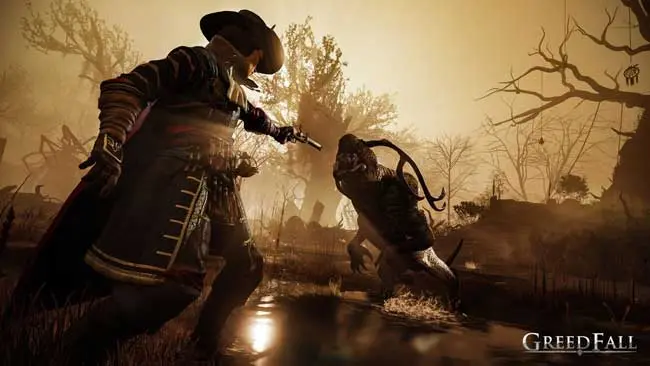
Greedfall is an action RPG in the vein of a Bioware game like Mass Effect, except it is set in a 17th-century fantasy world. The result is fairly satisfying, but it will leave you wishing that the developers had more time to iron out some kinks.
It starts in Serene, a port city of the Congregation of Merchants located in what is basically 17th-century Europe. The main character, De Sardet, and his cousin leave the disease-ravaged old continent to set sail for a distant island, Teer Fradee, where the Merchants and other factions have established colonies.
Teer Fradee is something of a paradise compared to the old continent, which is overpopulated, polluted, and seeing the spread of an incurable disease known as the Malichor. The colonial powers look to Teer Fradee not only to exploit its resources but also in search of a cure.
Of course, Teer Fradee is not just a wild island. It has native tribes, much like the Americas before European colonists. Those tribes eventually come into contact and conflict as the colonists stake claims to land and bring their own culture – including a history of exploitation and racism – with them.
Greedfall clearly draws inspiration from history, but it also mixes the 17th-century colonialism with magic and fantasy. Teer Fradee is a wild island with many mysteries and wondrous, deadly creatures. It’s easy to completely forget that you have a mission and get lost exploring the island.
At least as far as combat is concerned, it’s the encounters with wild beasts that I found most appealing. Aside from a brief fight at the start of the game, it takes hours of build-up before you get a chance to wander around and explore the countryside.
While we’re on the topic, let’s talk a little bit more about the game’s combat. Sadly, this is one of the game’s weaker points. To be sure, it is not bad. Perhaps the best way to describe it is “adequate” since it gets enough right to prevent the game from being unplayable, but it is also not very satisfying.
Perhaps I should step back a second, though. At the start of the game, you can customize your character. There are three different classes: warrior, technical, and magic. Since I prefer melee combat, I went with the warrior. If you go with technical, your speciality is setting traps and firearms. If you go with magic… well, you know. It speaks for itself, right?
Okay, so at least with the warrior, the game gives you a light attack, a heavy attack, and a parry. You can also pause the game in mid-combat in order to find your bearings, use items like a health potion, and bind hotkeys to the d-pad arrows. This can be particularly useful during a hectic fight with low health.
Of course, low health or not, it might not matter since the AI in Greedfall is not particularly clever. On higher difficulty settings, their tactic is to aggressively attack, but this can be countered simply spamming parry/counter. If you are patient enough and play defensively, it’s possible to avoid ever getting hit in most battles – at least against human enemies.
The animals and monsters in the game can be trickier; you just have to get a feel for their normal attack pattern and then adapt your strategy as needed. That being said, there were situations where I felt overwhelmed against mobs of creatures, but that’s mostly because I ventured into areas without first having enough experience.
The strength of your attack depends at least in part on the type of weapon that you have equipped. And the weapon that you can equip depends on your skills. Assuming you defeat your enemy, you can loot their corpse to obtain new weapons, armor, cash, and other items. If you don’t have any use for them, you can sell them to a local merchant.
This is all pretty standard in most modern action-RPGs. And that’s actually a pretty significant point worth underlining: do not come into this game expecting something that is trailblazing. Greedfall does not break the mold in any way. If anything, Greedfall‘s core gameplay mechanics follow the standard action-RPG mold almost to a fault.
The game does attempt to offer players with alternatives, but it all feels rather shallow. Even playing as a warrior, the game still allows you to approach situations without using brute force. You can, for instance, attempt to sweet-talk your way out of certain situations or use stealth.
The approach that you take may depend on whether or not you care about your reputation with certain people and factions in the game. Depending on whether and how you complete side quests for the game’s various characters, your reputation will adjust accordingly. Just as in real life, your reputation precedes you and affects dialogue in the game.
Speaking of dialogue, that’s one of the strengths of Greedfall. Aside from having fairly good voice acting, the dialogue between De Sardet and his team, as well as NPCs, is relevant. They don’t go off on tangents. It provides you with plenty of backstory without being verbose. Thankfully, none of the main characters are particularly annoying, either, which can sometimes be a problem in these types of games.
In closing, Greedfall does a lot of things right, but it has fairly weak combat and it doesn’t tread a lot of new ground. Actually, let me revise that. It doesn’t tread any new ground. If you’re a fan of standard action-RPGs, there is a decent chance that you will enjoy this game. If you’re not, find something else to play.
Game Freaks 365 received a free review copy.

